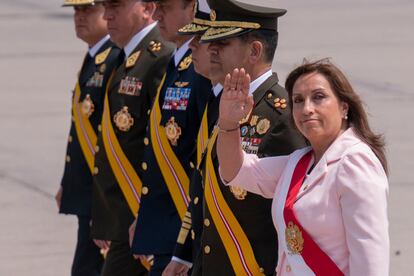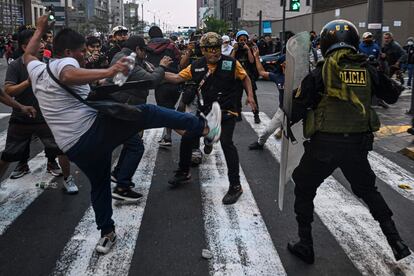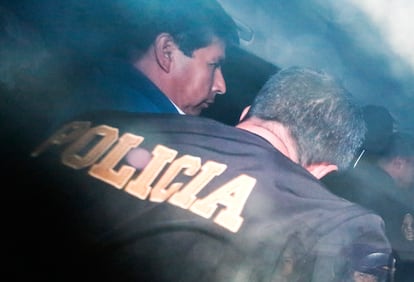The fall of Pedro Castillo, the latest episode in Peru’s turbulent history
The arrest of the former Peruvian president – impeached after attempting to shutter Congress – is another surprise in a long trail of short-lived governments


On the morning of Wednesday, December 7, Pedro Castillo attempted a typical Latin American “self-coup.” In a televised address – with his hands shaking as he read robotically from some pages – he announced his dissolution of the Congress, a curfew, a plan for a new constitution and his intention to “reorganize” the country’s judiciary. All these measures were needed, supposedly, because the legislative branch of Peru had not been allowing him to govern over the course of his 16 months in office.
Reportedly, after he concluded his 10-minute speech, one of his advisors – who had been kept out of the loop that morning – managed to enter the room. Castillo, wearing the presidential sash, was sitting at the table where he had given his address. He looked tired, dejected.
“Mr. President, what have you done?”
His lawyer later said that Castillo was drugged when he made the speech.
There were no tanks in the streets of Lima. No crowds to support him. The Armed Forces and the National Police refused to comply with his intention to govern by decree – the entire cabinet resigned. Not even three hours after the address, Castillo would flee the Government Palace with his family – en route to the Embassy of Mexico to seek asylum – and be arrested by his own security forces. The 130 members of Congress – including allies from his Marxist Free Peru party – would vote unanimously to impeach him. His vice president, Dina Boluarte – a lifelong civil servant – would be sworn in before dinnertime.
This will go down in history as one of the shortest-lived coups. It seemed clumsy, improvised, after not even a year-and-a-half into a fledgling government that saw Castillo’s approval rating drop below 20% and 70 cabinet ministers come and go.

After Castillo defeated the right-wing Keiko Fujimori – the daughter of former Peruvian president Alberto Fujimori – by a margin of less than 0.3% in the 2021 presidential elections, nobody expected much from him. He wasn’t a good speaker – he had no political experience. He was tied to a political party that was controlled by a former governor – Vladimir Cerrón – who had been banned from holding political office due to corruption. Cerrón was simply looking for a replacement. He settled on a union organizer from the Andes.
Now, Peru’s third indigenous president could face between 10 and 20 years in prison for the crime of rebellion.
“Castillo isn’t an accident in the history of Peru… he’s just the final example of a failed state,” declared César Hildebrandt, one of the country’s most prominent journalists.
In the last four years, Peru has had six presidents. Alfonso W. Quiroz – the author of The History of Corruption in Peru – notes that Castillo’s final, desperate act is part of a national tradition of presidents who have developed an appetite for “looting the state.”
However, despite the attempted coup perpetrated by Castillo – the fifth Peruvian president to face criminal charges – Peru is still standing. “But it is just an illusion,” says Hildebrandt. “Nations don’t fall down like buildings. They simply pretend to exist.”
With a Congress dominated by centrist and right-wing parties, the president wasn’t able to pass a promised constitutional reform. And, of course, Castillo shot himself in the foot time after time. From his first days in office, when he attempted to name Guido Bellido as prime minister – a political novice, who had been charged with apologizing for the Shining Path terrorist group, which brought Peru to its knees in the 1980s and early 1990s – abysmal appointments became a weekly occurrence.
Bellido’s nomination was shot down by legislators – as were dozens of other ministerial nominations, which included spousal-abusers and fake doctors. Sometimes, a minister lasted for only a few days, before being censured by two-thirds of the Congress.
Castillo governed with so much incompetence that many find it hard to believe that he even orchestrated the attempted coup, hours before he was facing a third impeachment vote. Who wrote the speech? Who encouraged him to violate the constitutional order? None of these questions have been answered.
In 1992, when former president Alberto Fujimori shut down the Peruvian Congress in the middle of the war against the Shining Path terrorist group, he had the support of his cabinet, the military, several judges and the majority of the population. While today’s Congress is certainly not popular, Castillo hardly has any popular support – even his few allies didn’t support this move, which seems to have been a cheap imitation of Fujimori’s self-coup, which took place during an actual national emergency. While Peru is currently plagued by droughts and the aftermath of the pandemic, the conditions do not merit exceptional measures.
Dictatorships have transformed Peru more than democracy. Fujimori’s administration (1990-2000) – despite the corruption that plagued 1990s – managed to put an end to hyperinflation and terrorism. And, decades earlier, from 1968 until 1975, General Juan Velasco Alvarado – a left-wing military dictator – initiated the Peruvian Agrarian Reform, which saw tens of millions of acres of land expropriated from its owners and distributed to the peasants.
Castillo’s father was a tenant farmer who directly benefited from this reform, receiving a plot in the town of Chota, in the mountainous region of Cajamarca. His son – born in 1969, the year that the Agrarian Reform was decreed – would manage to get an education, thanks, in part, to what their small farm produced.
“The systemic changes that the poorest sectors of Peru have needed have come from dictatorships, not democracies,” says Cecilia Méndez, a Peruvian historian at UC Santa Barbara, referring to the authoritarian administrations of Augusto Leguía (1919-30), Velasco (1968-75) and Fujimori (1990-2000).
“The traditional political elites have been immobile… they have never wanted to transform the country. That’s why democracy has been unsustainable in Peru, it doesn’t satisfy people’s basic needs. This means that there is a danger that others will opt for the [authoritarian] path. We’ve clearly seen this with Castillo’s attempt to rule by decree.”
Peru’s traditional political parties have almost completely disappeared. According to public opinion surveys, one-third of citizens decide who they plan on voting for less than two days before federal elections, which are held every five years.
“The parties are rented out… politics is just an auction of interests to different mafias,” Hildebrandt sighs. He has covered Peruvian politics since the 1970s.
Sociologist Sandro Venturo notes that Peruvians expect nothing from their politicians. In a country where voting is mandatory, elected officials are associated with two things: corruption and negligence.
“Opportunists and criminals feel encouraged to run for office, because they know that the voters aren’t demanding or attentive. This has been going on for several decades. The number of public authorities who have open cases in the court system is shocking,” Ventura explains.

In this malaise-filled atmosphere, Boluarte – the first female president in Peruvian history – has offered up a new cabinet of nonpartisan technocrats, which is set to be approved by the Congress. While nobody can predict how long this government will last, the country’s institutions have managed to safeguard democracy, while the new ministers – unlike the dozens who served under Castillo – each have solid expertise in their portfolios. For instance, the appointment of Alex Contreras to the Ministry of Finance has calmed markets after a turbulent week. He has spent more than 15 years working at the Central Bank and lecturing on monetary policy in local universities.
While most of the population is skeptical – cautiously optimistic at best – a few thousand have taken to the streets to demand new elections. Boluarte says that she intends to serve out the rest of the current presidential term, which is set to end in 2026.
Castillo did not even intend to be president – he reached the Government Palace by accident, in the shadow of Vladimir Cerrón, thanks to overwhelming support from the poorer and heavily Indigenous south of Peru. He didn’t last long in the spotlight – he raced from crisis to crisis, trying to balance the wishes of his Marxist political bosses with a conservative Congress. This chaos eventually led to a televised political suicide, before the eyes of the entire population.
Perhaps, in another country, this would have raised some eyebrows. But it was just another day in the political life of Peru.
Tu suscripción se está usando en otro dispositivo
¿Quieres añadir otro usuario a tu suscripción?
Si continúas leyendo en este dispositivo, no se podrá leer en el otro.
FlechaTu suscripción se está usando en otro dispositivo y solo puedes acceder a EL PAÍS desde un dispositivo a la vez.
Si quieres compartir tu cuenta, cambia tu suscripción a la modalidad Premium, así podrás añadir otro usuario. Cada uno accederá con su propia cuenta de email, lo que os permitirá personalizar vuestra experiencia en EL PAÍS.
¿Tienes una suscripción de empresa? Accede aquí para contratar más cuentas.
En el caso de no saber quién está usando tu cuenta, te recomendamos cambiar tu contraseña aquí.
Si decides continuar compartiendo tu cuenta, este mensaje se mostrará en tu dispositivo y en el de la otra persona que está usando tu cuenta de forma indefinida, afectando a tu experiencia de lectura. Puedes consultar aquí los términos y condiciones de la suscripción digital.








































